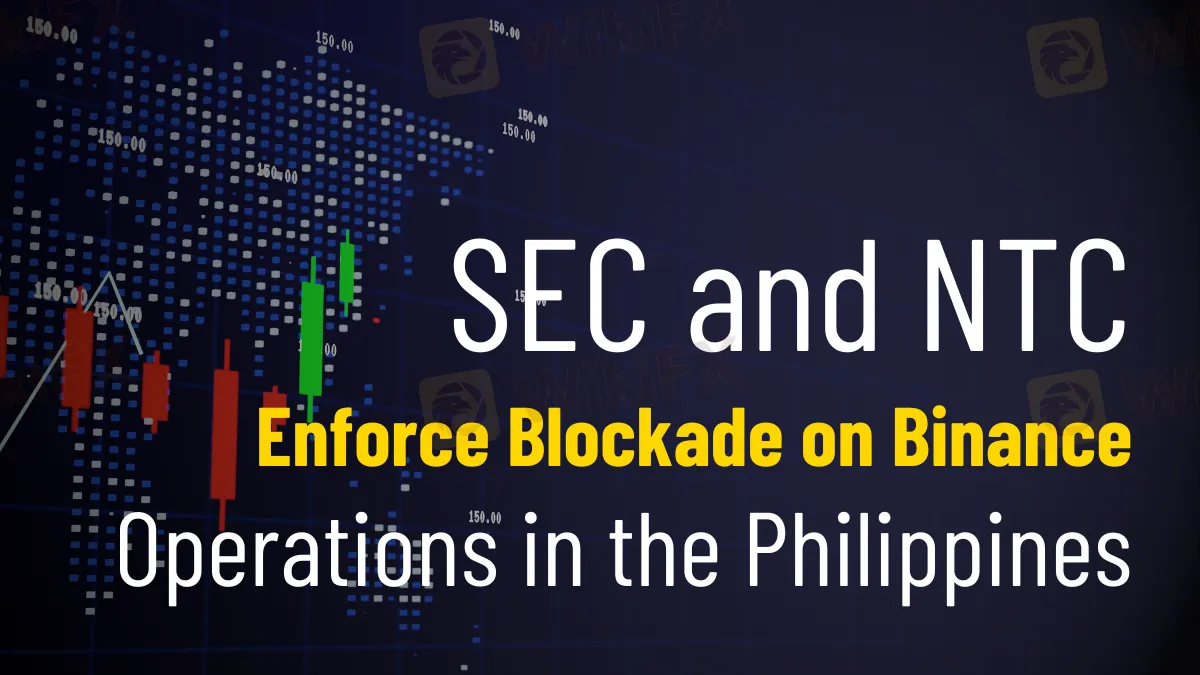简体中文
繁體中文
English
Pусский
日本語
ภาษาไทย
Tiếng Việt
Bahasa Indonesia
Español
हिन्दी
Filippiiniläinen
Français
Deutsch
Português
Türkçe
한국어
العربية
SEC and NTC Enforce Blockade on Binance Operations in the Philippines
Abstract:Philippines' SEC, with NTC's aid, blocks Binance, impacting its global cryptocurrency operations due to lack of proper licenses, aiming to protect local investors.

The Philippines' Securities and Exchange Commission (SEC) has shut down Binance's website and networks, affecting the world's biggest cryptocurrency exchange. After the March 12 SEC meeting, Binance operates without domestic trading and investment platform authorization. The SEC could not keep this ban operating on itself, so it asked the National Telecommunications Commission for help.
Binance is known worldwide for its financial products. Leveraged spot trading, futures and options contracts, cryptocurrency savings accounts, staking services, and ICO platforms are instances. Binance trades over 402 coins daily, averaging $65 billion thanks to its 183 million daily users.
SEC's primary concern is to protect Filipino investors from the risks associated with keeping Binance's services open to the public. Because it failed to get the required licenses to solicit public investments or operate a securities exchange, the regulatory body stressed that Binance had violated Republic Act No. 8799, also known as The Securities Regulation Code (SRC). Companies that run securities exchanges and seek public investments in the Philippines must required to get licenses under this legislation.

Despite its extensive global network and several services, Binance faces significant regulatory challenges due to its operation in the Philippines without an SEC license. No one should utilize or invest in Binance, the SEC warned as far back as November 2023. Amid a broader effort to halt the spread of illegal investment opportunities online, the SEC shut down OctaFX and MiTrade in February. The protected interest of Filipino investors was the driving force behind this undertaking.
There has been no ignoring Binance's efforts to attract Filipino customers, as the company has launched massive advertising campaigns on many social media platforms. Now that the Binance app is available in both the Google Play Store and the Apple App Store, it is reaching a wider audience of prospective Pinoy investors.
In light of these events, the SEC wasted no time granting Filipino investors a grace period during which they may transfer their cash out of Binance and onto other certified platforms and products. This strategy protects investors while maintaining the integrity of the Philippines' financial markets.
Account holders assert that Binance's standing with the regulatory bodies in the Philippines has improved after the SEC's moves.
Bans on Binance by the SEC and NTC have marked a turning point in the Philippines' efforts to rein in the booming cryptocurrency industry. To companies operating in the financial services sector, it serves as a timely reminder of the critical need to comply with local legislation, especially in industries as fluid and rapidly evolving as bitcoin investment and trading.

Disclaimer:
The views in this article only represent the author's personal views, and do not constitute investment advice on this platform. This platform does not guarantee the accuracy, completeness and timeliness of the information in the article, and will not be liable for any loss caused by the use of or reliance on the information in the article.
Read more

Bitcoin Nears $100,000: A Triumph of Optimism or a Warning Sign?
Bitcoin’s meteoric rise continues to capture global attention as its price recently surpassed the $99,000 mark, briefly approaching the $100,000 milestone. This unprecedented rally has led market sentiment to reach a state of “extreme greed,” according to the Fear and Greed Index. Analysts suggest that the market may be entering overheated territory, raising questions about sustainability amidst ongoing enthusiasm.

FCA Alerts Traders to New List of Unregulated and Clone Brokers
Protect your investments! Learn about unregulated firms flagged by the FCA and discover how WikiFX helps traders avoid scams and choose legitimate brokers.

Hackers Charged for $11M Crypto Theft Using SIM-Swaps
Hackers charged for stealing $11M in crypto using SIM swaps and phishing. Discover how the Scattered Spider group exploited security flaws to target victims.

Google Warns of New Deepfake Scams and Crypto Fraud
Google exposes deepfake scams, crypto fraud, and app cloning trends. Learn how to spot these threats and safeguard your data with expert tips and advice.
WikiFX Broker
Latest News
Webull Partners with Coinbase to Offer Crypto Futures
eToro Expands Nationwide Access with New York Launch
GCash, Government to Launch GBonds for Easy Investments
Why Is UK Inflation Rising Again Despite Recent Lows?
Hackers Charged for $11M Crypto Theft Using SIM-Swaps
Interactive Brokers Launches Tax-Friendly PEA Accounts in France
Google Warns of New Deepfake Scams and Crypto Fraud
Former Director Sentenced for Share Disclosure Breach
PayPal Expands PYUSD Use for Seamless Cross-Border Transfers
Trump Media in Talks to Acquire Crypto Firm Bakkt
Currency Calculator


